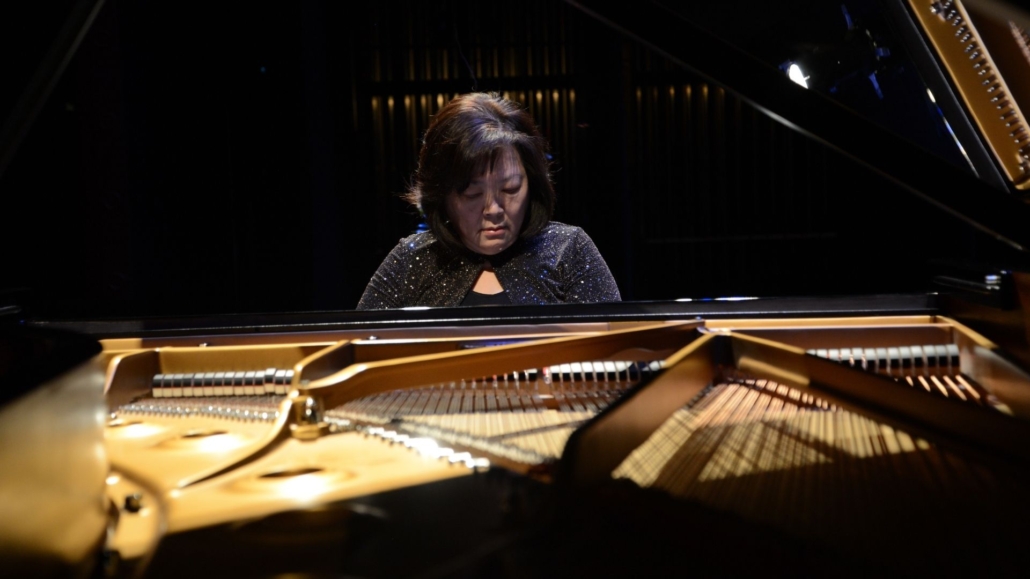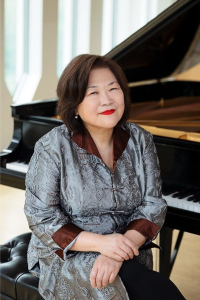Although his music is no less vital today than it was during his brief lifetime, which spanned the years from 1756 to 1791, listening to Wolfgang Amadeus Mozart requires a certain degree of looking back. His courtly elegance (and his ability to mock courtly elegance), his simplicity, and his relative lack of angst belong to a bygone era and deserve to be judged by the standards of that era, even for those of us sympathetic to Glenn Gould’s provocative but perceptive analysis of a composer that he both loved and loathed.
There is “an element of theatricality [in Mozart] to which my puritan soul strenuously objects,” Gould once told his film biographer, the French director Bruno Monsaingeon. And while one would expect nothing less from the composer of 22 operas, one has to admit that Gould has a point.
For another great Canadian pianist, however, Mozart is never less than sublime. And when Angela Cheng casts her mind back to 1784, when Mozart penned his Piano Concerto No. 17 in G major, she’s also remembering the early days of her own glittering career, and the first recording session of her life.
The year was 1991, the venue was Vancouver’s elegant Orpheum Theatre, in support were the musicians of the much-missed CBC Vancouver Orchestra, and the Piano Concerto No. 17 was on the program, along with the Piano Concerto No. 9 in E-flat major. On the podium was Mario Bernardi, a beloved titan of classical music in Canada from 1968, when he became the founding conductor of the National Arts Centre Orchestra, until his death in 2013.
Cheng still thinks of him fondly. “Working with Mario… How can I say it? It was such a privilege,” she enthuses. “I so admire the way he heard music, especially the music of Mozart. And I didn’t know him very well; we had one performance before this invitation happened. I think I came to the first rehearsal of the recording and it was lunchtime, and he said ‘Do you want to get some lunch?’ I said ‘Okay.’ And, I mean, I was so nervous: this was my first recording, and I really didn’t know what to expect. I tried to be as prepared as possible, and he just looked at me and said ‘Don’t worry! Unlike a concert, you can do it again, over and over again. So not to worry.’
“I was like ‘Oh, that’s so sweet.’ He was really trying to help me, and make me as comfortable as possible.”
Did Bernardi have specific advice for the young pianist when it came to the Piano Concerto No. 17?
“We talked about orchestration,” Cheng recalls.”You know, ‘Why did he put that voice or that line there? Why did he give it to a horn? Why did he give it to this instrument versus another instrument?’ The range. How he wrote for each instrument with such a signature that if you hear it you’re ‘I think that may be Mozart,’ even if you didn’t recognize it already. And how everything was vocal. It’s like singing. So the timing of a melody, it’s all vocally rooted and inspired. I think I kind of felt that way already, but having it articulated was very, very inspiring to me.
“And then everything, it comes from the heart,” Cheng continues. “It’s not just playing what’s on the page: you react to the music, you filter it through you and through your knowledge of what his style is, or what classical style is. Then you deliver it to your audience with care and with respect and with understanding.”
Thirty-three years on from Cheng’s vinyl debut, which can still be found online with a little searching, how does she think about the Piano Concerto No. 17 today?
“That’s a very good question,” she says. “I think every time I go back to a piece, I see it through a different lens because of what I’ve experienced personally. During the recording, I was still a student. I’d had concerts, of course, by then, and competitions and stuff, but it was the beginning of my career, I guess. Since then, I’ve had children, and I have been a teacher as well, besides the playing. Different things have happened in my life, like I lost my mother fairly recently. So it’s with what you’ve experienced in life that you start to understand and express the joys, for example, of the last movement,. The joys I had when I was recording this were a different kind of joy than those I have today. Then, I didn’t have the memories of my kids when they were young—or as they are now. Those kinds of joys are different. So you kind of interpret it depending on what you’ve gone through in your own life.
“I’m grateful for that,” she adds. “Can you imagine playing it the exact same way for 33 years?”
In this, one suspects, Cheng and Gould would be very much on the same page.
Something that unites Mozart’s Piano Concerto No. 17 and Anton Dvořák’s Symphony No. 7 in D minor, which share this program with the 19th-century composer Emilie Mayer’s alternately dramatic and wistful Overture No. 3 in C Major, is that they are both notably open to misinterpretation. More than one misguided soul, for instance, has written that Mozart’s concerto, written for his student Barbara Ployer, is “an extraordinarily feminine piece”, an assessment that Cheng strenuously disputes.
“That’s interesting,” she says skeptically. “Very interesting! Look, over the years, when something is very beautiful and melodious, very often people think that it’s feminine. I just think it’s beautiful, whether it’s played by a female musician or a male musician. It’s not gendered. But I’ve experienced this over the years, and I just kind of smile politely and then go on.”
Similarly, Dvořák’s Seventh is often characterized as an upwelling of the Czech soul, and it was written during a time when Prague and its environs were in rebellion against the yoke of the Austrian Empire. Yet the work was commissioned by the Royal Philharmonic Society, premiered in London in 1885, and owes as much to Johannes Brahms as it does to Slavic nationalism.
As ever, music is what we make of it, so listen closely and decide for yourselves.
Notes by Alex Varty




 Angela Cheng, piano
Angela Cheng, piano